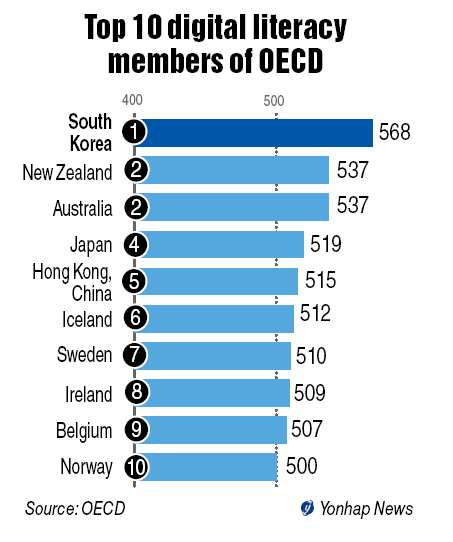Young South Koreans learn the best from computers and the Internet according to a survey of 15 year-olds in 19 countries, the Organization for Economic Cooperation and Development said on Monday.
The OECD, which groups 34 of the world’s most advanced economies, tested the digital literacy of students in 16 member countries as well as Colombia and the Chinese cities of Hong Kong and Macao as part of its Program for International Assessment.
In most countries, the results were in line with the results of a 2009 survey in print reading skills, the OECD said.
But students performed “significantly better” in digital reading than print in Korea, Australia, New Zealand, Sweden, Iceland and Macao, the survey demonstrated.
The opposite was true in Poland, Hungary, Chile, Austria, Hong Kong and Colombia.

South Korea secured 568 points, 31 points ahead of the runners-up, New Zealand and Australia (both 537 points). Japan was fourth with 519 points, followed by Hong Kong, China, with 515 points.
“Korean students are found to have excellent print media reading comprehension and their ability to solve problems using the Internet is even better,” a Seoul Education Ministry official said. “We should turn school education to well adapt to the digital era, so these strong points can be maximized.”
The Paris-based OECD said that boys improved their performance when compared to the print survey, but still trailed girls.
When using computers, “girls scored an average of 24 points more, compared to a difference of 39 points in print, the equivalent to one year of schooling,” the OECD said.
The OECD said computer use at school had a small impact on results, while home-use proved influential.
Educators should better integrate computers into curricula and classrooms and policy-makers should invest more “in training teachers to use computers for teaching,” the organization said.
“Digital technologies provide a great opportunity to make students more active participants in classroom learning,” Barbara Ischinger, director of education at the OECD said.
(From news reports)
The OECD, which groups 34 of the world’s most advanced economies, tested the digital literacy of students in 16 member countries as well as Colombia and the Chinese cities of Hong Kong and Macao as part of its Program for International Assessment.
In most countries, the results were in line with the results of a 2009 survey in print reading skills, the OECD said.
But students performed “significantly better” in digital reading than print in Korea, Australia, New Zealand, Sweden, Iceland and Macao, the survey demonstrated.
The opposite was true in Poland, Hungary, Chile, Austria, Hong Kong and Colombia.

South Korea secured 568 points, 31 points ahead of the runners-up, New Zealand and Australia (both 537 points). Japan was fourth with 519 points, followed by Hong Kong, China, with 515 points.
“Korean students are found to have excellent print media reading comprehension and their ability to solve problems using the Internet is even better,” a Seoul Education Ministry official said. “We should turn school education to well adapt to the digital era, so these strong points can be maximized.”
The Paris-based OECD said that boys improved their performance when compared to the print survey, but still trailed girls.
When using computers, “girls scored an average of 24 points more, compared to a difference of 39 points in print, the equivalent to one year of schooling,” the OECD said.
The OECD said computer use at school had a small impact on results, while home-use proved influential.
Educators should better integrate computers into curricula and classrooms and policy-makers should invest more “in training teachers to use computers for teaching,” the organization said.
“Digital technologies provide a great opportunity to make students more active participants in classroom learning,” Barbara Ischinger, director of education at the OECD said.
(From news reports)











![[Hello India] Hyundai Motor vows to boost 'clean mobility' in India](http://res.heraldm.com/phpwas/restmb_idxmake.php?idx=644&simg=/content/image/2024/04/25/20240425050672_0.jpg&u=)







